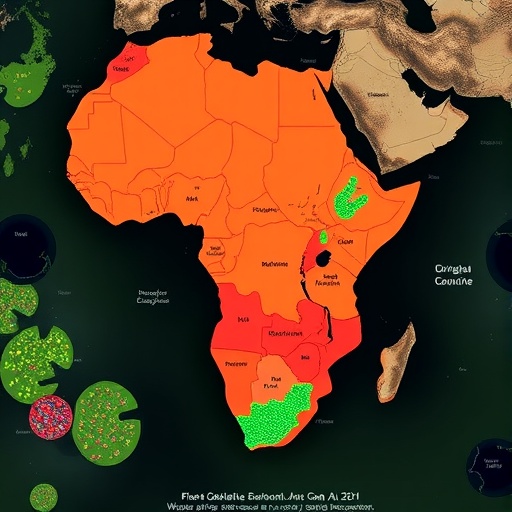In a groundbreaking study published in Nature Communications, researchers have unveiled a critical link between the fragmentation of wetlands and the presence of large human populations across the African continent. This extensive investigation sheds light on how expanding human settlements directly impact some of the most ecologically vital but vulnerable wetland ecosystems on Earth. The study combines satellite remote sensing data with advanced spatial analytics and demographic mapping techniques, delivering one of the most comprehensive assessments of wetland fragmentation in Africa to date.
Wetlands are integral components of the global environmental system, serving as crucial habitats for diverse flora and fauna, natural filters for water purification, and buffers against climate extremes such as floods and droughts. Despite their importance, wetlands worldwide have been under increasing pressure from anthropogenic activities, ranging from agricultural expansion and urban development to infrastructure projects. Africa, with its rapidly growing human population and widespread wetland biomes, stands at the forefront of this pressing environmental challenge.
The research team, led by Garba, Ebmeier, and Bastin, employed a multidisciplinary methodology to quantify how wetland fragmentation correlates with densely populated areas. Utilizing the latest generation of high-resolution satellite imagery coupled with comprehensive population density databases, the study identified fragmentation metrics such as patch size reduction, edge effects, and connectivity loss in wetlands across multiple biogeographical zones in Africa.
One of the critical findings highlights that wetlands in regions with populations exceeding a certain threshold experienced significantly higher fragmentation. This fragmentation manifests as breaking continuous wetland habitats into smaller, isolated patches, disrupting hydrological flows and the movement of species reliant on these habitats. The degradation affects both ecosystem services and biodiversity, undermining water regulation functions and threatening species endurance.
Significantly, the study spots intense fragmentation in critical wetland areas like the Okavango Delta, the Nile basin floodplains, and the Niger River wetlands. These regions, historically characterized by vast and contiguous wetland systems, now show pronounced signs of wetland loss and fragmentation, coinciding with urban development and agricultural intensification. The decoupling of wetland patches here poses new challenges for conservation efforts and sustainable resource management.
An intriguing aspect of the research lies in the use of landscape ecology and fragmentation theory to interpret the spatial patterns observed. The researchers applied fragmentation indices commonly used in forest ecology—such as patch cohesion and perimeter-area ratio—but adapted them to the unique hydrological and ecological dynamics of wetlands. This approach allowed for a more nuanced understanding of how human activities reshape these landscapes beyond simple area loss.
The strong correlation between population density and wetland fragmentation also raises urgent questions about land-use policies and planning in Africa’s rapidly urbanizing regions. The authors point toward the necessity of integrating wetland conservation into urban and agricultural development frameworks, emphasizing that unchecked expansion threatens both environmental sustainability and human well-being.
Importantly, the study discusses the ecological ramifications of fragmentation in detail, including the increased vulnerability of wetland-dependent species. Fragmented wetlands often suffer from edge effects, where altered microclimates and invasive species penetration degrade habitat quality. The disruption of hydrological connectivity inhibits nutrient cycling and can lead to localized drying, further stressing wetland resilience against climate variability.
The social consequences are equally profound. Wetlands provide critical ecosystem services to millions of Africans, offering water for domestic and agricultural use, supporting fisheries, and providing natural flood mitigation. As fragmentation increases, these services become less reliable, disproportionately impacting rural and marginalized communities dependent on them for livelihoods and food security.
The researchers deploy innovative spatial modeling techniques to simulate future scenarios of wetland fragmentation based on projected population growth patterns. Their models indicate that, without concerted intervention, fragmentation will intensify by mid-century, placing additional strain on already stressed wetland systems. This projection underscores the urgent need for policies that balance development with ecosystem conservation.
In response to these findings, Garba and colleagues advocate for a multifaceted approach to wetland management. This includes strengthening protected area networks, promoting sustainable agricultural practices that minimize wetland encroachment, and investing in green infrastructure solutions that preserve hydrological function within urban landscapes.
Furthermore, the study highlights the role of community-based conservation initiatives, recognizing that local knowledge and participation are essential to maintaining wetlands in the face of rapid demographic changes. Empowering communities through education and sustainable resource management strategies is vital for safeguarding these ecosystems for future generations.
This research also opens avenues for technological innovation in environmental monitoring. By combining high-resolution satellite data with machine learning algorithms, future studies can track wetland fragmentation trends in near real-time, facilitating timely conservation responses and policy adjustments.
The implications of this study extend beyond Africa, offering valuable lessons for wetland conservation globally. It exemplifies how integrating ecological theory, remote sensing technology, and socio-demographic analysis can reveal intricate human-environment interactions, informing more adaptive and effective ecosystem management strategies.
As the planet faces escalating environmental challenges and accelerating land-use change, this work provides a crucial evidence base to guide international efforts aimed at preserving wetland ecosystems. The authors emphasize that wetlands, often overlooked compared to forests or coral reefs, deserve urgent attention given their disproportionate ecological and social importance.
Ultimately, this comprehensive assessment by Garba, Ebmeier, Bastin, and their collaborators serves as a clarion call to scientists, policymakers, and the public. Addressing wetland fragmentation associated with growing populations is not just an environmental imperative but a foundational step towards achieving sustainable development and climate resilience.
Subject of Research: Wetland fragmentation and its association with population growth across Africa.
Article Title: Wetland fragmentation associated with large populations across Africa.
Article References:
Garba, S.I., Ebmeier, S.K., Bastin, J.F. et al. Wetland fragmentation associated with large populations across Africa. Nat Commun 16, 5065 (2025). https://doi.org/10.1038/s41467-025-59373-2
Image Credits: AI Generated




